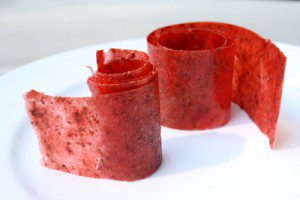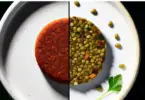By Kimberley Stakal – organicauthority.com
Ready to pull out the food dehydrator from under your kitchen sink and put that piece of culinary machinery to good work, finally?
Dehydrating your own foods saves on grocery costs, affords you the opportunity to make dried foods without additives or preservatives, and is a great way to get in touch with that old-fashioned cook deep inside your modern self.
Here are five great foods to dehydrate at home—plus ways to dry them out without a formal dehydrator, if you don’t have one.
[pro_ad_display_adzone id=”110028″]
Herbs
Growing your own herbs this season?
Don’t let today’s abundance become tomorrow’s waste. You can puree bulk fresh herbs into pesto, place them in oil and freeze them, or dry them out for homemade dried herbs. In this article from About.com, gardening writer Marie Iannotti describes a basic way to clean, bundle, and hang-dry fresh herbs at home. Or if you’ve got a dehydrator at home that you’d like to give a whirl, you can follow the photo tutorial from About.com writer Amy Jeanroy found here.
Fruit Roll-Ups
Dehydrated fruit strips are not only a kid’s fave snack; they’re also a total treat for grown-ups. Make your own all-natural version with this simple recipe for apricot roll-ups from YumSugar. Or head over to the food blog Our Best Bites for a step-by-step photo tutorial on making mixed fruit roll-ups that looks simply scrumptious.
Raw Crackers
Lovers of crispy, crunchy snacks will probably be natural lovers of raw crackers. They’re often loaded with wholesome nuts, grains, and spices, and are wonderful sub-ins for thick-cut potato chips or fried pitas. If you’ve got a dehydrator, try out this recipe from The Rawtarian, which calls upon raisins, citrus, and flax seeds. Or check out the great tips from Raw Food Witch on doing it without a dehydrator.
Jerky
In Emeril’s simple jerky recipe from the Food network, raw meat is seasoned and cooked in a 200 °F oven for 6 to 8 hours. Of course, this particular recipe calls for his signature Creole-inspired spice mixture, but you could certainly experiment with using your own fave rubs and spice blends in this formula. For an in-depth explanation of both the steps and the safety of making jerky in a dehydrator, check out this guide from University of Wisconsin Extension. Or better still, read our very own 3 recipes for jerky here.
Fruits
The website Kitchen Stewardship has a nice in-depth tutorial on the process of dehydrating different fruits. Some, like apples and bananas, may benefit from having a citrus soaking before you toss them in the dehydrator. Others, like strawberries, are as simple as slicing and drying. There are some good tips in this article on identifying the point when your fruits are fully dried out, and how to prep each fruit for proper dehydration. For DIY fruit-drying without a dehydrator, leave it to fellow food lovers at The Kitchn to give us some tips.
Article Source
www.organicauthority.com
[pro_ad_display_adzone id=”110027″]







